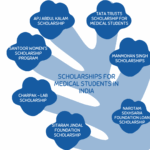My Journey to Code: Unlocking Scholarships for Computer Science Majors (And How You Can Too!)
I remember it like yesterday. Sitting at my cramped desk, the glow of my laptop screen illuminating the daunting university tuition fees. A knot formed in my stomach. Computer Science was my dream – building, creating, solving problems with code – but the financial barrier felt like an unscalable wall. "How on earth will I afford this?" I whispered to myself, the question echoing in the silent room.
If you’re reading this, chances are you’ve felt that same pang of anxiety. You love the idea of diving into algorithms, artificial intelligence, cybersecurity, or game development. You see the future in tech, and you want to be a part of it. But the price tag for a top-notch Computer Science degree can be, well, terrifying.
Here’s my secret, my golden ticket: scholarships.
Yes, scholarships. Not just for the straight-A valedictorians, or the Olympic athletes, but for determined individuals like you and me who have a genuine passion for the world of computing. My journey from a wide-eyed beginner, intimidated by the cost, to a Computer Science graduate was paved with these incredible opportunities. And today, I want to share everything I learned, from where to look to how to craft an application that truly shines.
So, grab a cup of coffee, settle in, and let me tell you my story – and show you how to write your own success story with scholarships for computer science majors.
The Big Question: Why Focus on Scholarships for Computer Science?
Before we dive into the "how," let’s quickly address the "why." Computer Science isn’t just a hot field; it’s the engine driving our modern world. From the apps on your phone to the self-driving cars of tomorrow, CS professionals are at the forefront of innovation. This high demand translates into:
- High Salaries: CS graduates are among the highest-paid entry-level professionals.
- Abundant Opportunities: Jobs are plentiful and diverse across every industry.
- Investment from Industry: Companies want talented CS minds. They invest in future talent through scholarships because they know it’s a direct pipeline to their workforce.
This last point is crucial. Unlike some other fields, there’s a significant amount of money specifically earmarked for Computer Science students. The competition is real, but so are the chances!
My Treasure Map: Where I Found Computer Science Scholarships
When I first started looking, I felt overwhelmed. There were so many websites, so many lists. It was like trying to find a needle in a digital haystack. But with persistence, I started to see patterns and categories. Think of these as different islands on your scholarship treasure map:
1. University-Specific Scholarships: Your First Stop
This is often the easiest place to start, and where I found my first glimmer of hope. When you apply to a university’s Computer Science program, they often have their own pool of funds.
- How I approached it: I always checked the "Financial Aid" and "Scholarships" sections of every university’s website I was interested in. Sometimes, a single application to the university automatically put me in contention for their general scholarships. Other times, the CS department had its own dedicated scholarships.
- What to look for: Look for scholarships specifically for incoming freshmen CS majors, transfer students in CS, or current CS students based on merit (GPA), need (financial situation), or specific achievements (like a programming competition). Don’t forget to check if they have scholarships for underrepresented groups in tech, like women in computer science or minority students.
2. Industry and Company-Sponsored Scholarships: The Big Players
This category excited me the most! Major tech companies and even smaller, innovative startups understand the value of investing in future talent. They want to nurture the next generation of engineers, developers, and researchers.
- My big dreamers: Companies like Google, Microsoft, Apple, Amazon, Facebook (Meta), Intel, and countless others offer substantial scholarships. These often come with incredible perks, like mentorship opportunities, invitations to exclusive events, and even guaranteed internship interviews.
- Smaller, but mighty: Don’t just aim for the giants! Many smaller, specialized tech companies, software firms, and even local businesses offer scholarships in their specific niche (e.g., cybersecurity, data science, mobile app development).
- How I found them: I used scholarship search engines (which we’ll talk about later), but I also directly visited the "Careers," "Diversity & Inclusion," or "Community" sections of major tech company websites. Many even have specific pages dedicated to their educational initiatives.
3. Professional Organizations & Non-Profits: Community Support
These organizations are dedicated to advancing specific fields within computer science or supporting specific groups of people. They’re often overlooked but can be a fantastic source of funding and community.
- Key players I looked into:
- ACM (Association for Computing Machinery): The world’s largest educational and scientific computing society.
- IEEE (Institute of Electrical and Electronics Engineers): While broader, they have many initiatives for computer science and engineering students.
- NCWIT (National Center for Women & Information Technology): A fantastic resource for women in computer science scholarships.
- SWE (Society of Women Engineers): Another great one for women pursuing STEM, including CS.
- SHPE (Society of Hispanic Professional Engineers) / NSBE (National Society of Black Engineers): Excellent resources for minority scholarships computer science.
- AFCEA (Armed Forces Communications and Electronics Association): For those with military connections or an interest in defense tech.
- My approach: I looked up professional organizations related to CS, joined their mailing lists, and checked their "Scholarships" or "Student Programs" sections regularly. Often, these scholarships require you to be a member, but student memberships are usually very affordable or even free.
4. Government & National Programs: Investing in the Future
Governments, both federal and state, invest heavily in STEM education to ensure their countries remain competitive.
- In the US: The National Science Foundation (NSF) has various programs, including scholarships for students pursuing STEM degrees. The Department of Defense (DoD) also offers scholarships, often with a service commitment attached, which can be a great path for some.
- Outside the US: Many countries have similar national initiatives. Always check your country’s Ministry of Education or equivalent for STEM funding.
- How I explored: These tend to be more competitive but offer significant awards. I looked for broad "STEM scholarships" as well as specific "computer science government grants."
5. Local Community & Alumni Associations: Close to Home
Don’t underestimate the power of your local community!
- Local businesses and clubs: Your hometown might have rotary clubs, chambers of commerce, or local businesses that offer scholarships to students from the area.
- High school alumni associations: Your high school might have an alumni fund specifically for graduates pursuing higher education, sometimes even for specific fields.
- University alumni: Once you’re in a university, their alumni network often has scholarships for current students.
- My advice: Check with your high school guidance counselor, local library, or community center. They often have lists of local scholarships that national search engines might miss.
My Application Strategy: More Than Just Good Grades
Getting a scholarship isn’t just about having a perfect GPA (though good grades certainly help!). It’s about telling your story, showing your passion, and demonstrating your potential. Here’s how I approached my applications:
1. Start Early, Start Very Early!
This is perhaps the most critical piece of advice I can give you. Many scholarship deadlines are months before university application deadlines, sometimes even a year in advance for high school seniors.
- My experience: I started my scholarship search in my junior year of high school. It felt overwhelming at first, but it gave me ample time to gather materials, write essays, and get recommendations without feeling rushed.
- Your takeaway: Mark those deadlines on your calendar! Create a spreadsheet with scholarship names, requirements, and due dates. Don’t wait until the last minute.
2. Tell Your Story: The Personal Statement is Your Superpower
Every scholarship application will ask for an essay or personal statement. This is your chance to stand out from a sea of applicants with similar grades and test scores.
- What worked for me: I didn’t just list my achievements. I told stories. I wrote about the first time I built a simple game, the frustration of debugging a tricky piece of code, or how a particular tech innovation inspired me. I explained why Computer Science, why now, and what I hoped to achieve.
- Show, don’t just tell: Instead of saying "I am passionate about coding," describe a project you worked on, the challenges you faced, and the satisfaction of seeing it come to life.
- Be authentic: Don’t try to be someone you’re not. Let your genuine enthusiasm shine through.
3. Show Your Passion: Beyond the Classroom
Scholarship committees want to see that you’re truly invested in Computer Science, not just doing it because it’s a popular major.
- My extra-curriculars: I joined my high school’s robotics club, participated in a local hackathon (even though I barely knew what I was doing at first!), and taught myself Python through online courses.
- What you can do:
- Personal projects: Build a simple website, a small app, or automate a task with code. Even if it’s basic, it shows initiative.
- Coding clubs/competitions: Join your school’s coding club or participate in online programming contests.
- Volunteer work: Can you use your budding CS skills to help a local non-profit with their website or data?
- Online courses/certifications: Sites like Coursera, edX, or freeCodeCamp offer excellent ways to learn and gain verifiable skills.
4. Get Stellar Recommendations
A strong letter of recommendation can make a huge difference. Choose teachers, mentors, or supervisors who know you well and can speak genuinely about your character, work ethic, and potential.
- My tip: Ask early! Give your recommenders plenty of time (at least 2-3 weeks). Provide them with your resume, the scholarship requirements, and a brief reminder of your goals and why you’re applying for that specific scholarship. Make it easy for them to write a compelling letter.
5. Proofread, Proofread, Then Proofread Again
A sloppy application with typos or grammatical errors sends a clear message: you don’t care enough to pay attention to detail. This is especially critical for a field like Computer Science, where precision is paramount.
- My method: I always proofread my essays multiple times, then used online tools like Grammarly, and finally, had a trusted friend or family member read it over. A fresh pair of eyes can catch mistakes you’ve overlooked.
6. Apply to Many, But Thoughtfully
It’s a numbers game to some extent, but don’t just blindly apply to every scholarship. Focus your efforts on those where you meet the criteria and genuinely feel you have a strong chance.
- My strategy: I aimed for a mix of "reach" scholarships (the big ones from Google, etc.), "good fit" scholarships (from professional organizations or my target universities), and "local/smaller" scholarships (where competition might be lower). Each application took time, so I prioritized.
Beyond the Money: The Unseen Perks of Computer Science Scholarships
While the financial relief is undoubtedly the biggest benefit, I quickly realized that scholarships offered so much more than just money.
- Networking Opportunities: Many corporate or organizational scholarships come with events, conferences, or mentorship programs. These put you in direct contact with industry professionals, potential employers, and other talented students. I met some incredible people this way, some of whom became mentors and friends.
- Mentorship: Some scholarships explicitly pair you with an industry mentor. This guidance can be invaluable as you navigate your studies and early career.
- Internship Leads: Being a scholarship recipient from a major tech company can open doors to internships, which are crucial for gaining real-world experience and often lead to full-time job offers.
- Confidence Boost: Earning a scholarship is a huge validation of your hard work and potential. It fueled my motivation and made me believe even more in my abilities to succeed in a challenging field.
- Resume Booster: Having "Scholarship Recipient" on your resume looks fantastic to future employers. It shows initiative, academic excellence, and external validation of your talent.
My Final Words of Encouragement
The path to a Computer Science degree can be challenging, both academically and financially. But please, do not let the cost deter you. There is an incredible amount of support out there for aspiring computer scientists.
My journey from that anxious student staring at tuition bills to a confident programmer was made possible by the generosity of these programs. It took effort, persistence, and a lot of late nights writing essays, but every single minute was worth it.
So, take a deep breath. Start your search. Craft your story. Show the world your passion for code. The scholarships for computer science majors are out there, waiting for you to find them. Your future in tech is within reach. Go get it!



